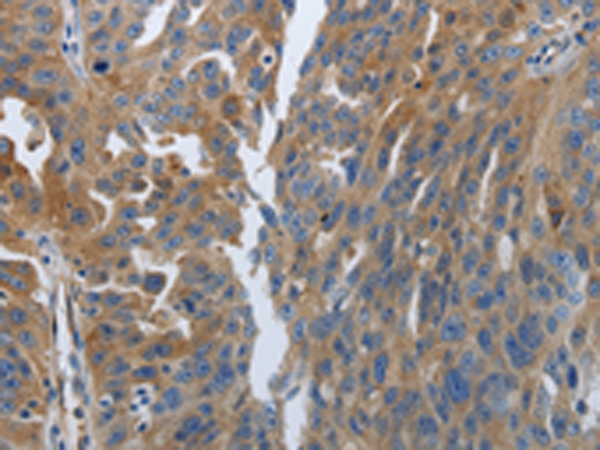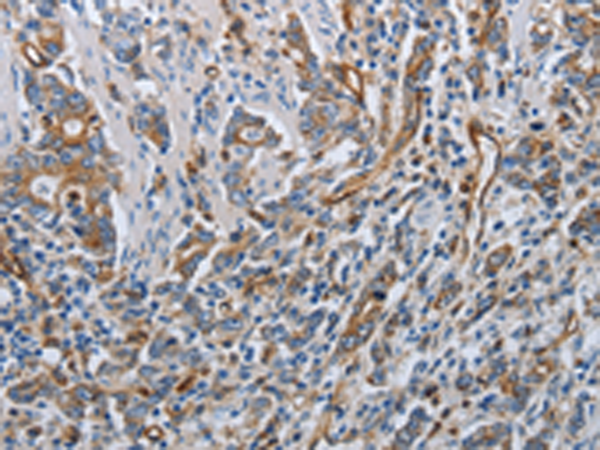


| WB | 咨询技术 | Human,Mouse,Rat |
| IF | 咨询技术 | Human,Mouse,Rat |
| IHC | 1/50-1/200 | Human,Mouse,Rat |
| ICC | 技术咨询 | Human,Mouse,Rat |
| FCM | 咨询技术 | Human,Mouse,Rat |
| Elisa | 1/2000-1/10000 | Human,Mouse,Rat |
| Aliases | JAB, CIS1, SSI1, TIP3, CISH1, SSI-1, SOCS-1 |
| WB Predicted band size | 24 kDa |
| Host/Isotype | Rabbit IgG |
| Antibody Type | Primary antibody |
| Storage | Store at 4°C short term. Aliquot and store at -20°C long term. Avoid freeze/thaw cycles. |
| Species Reactivity | Human, Mouse, Rat |
| Immunogen | Synthetic peptide of human SOCS1 |
| Formulation | Purified antibody in PBS with 0.05% sodium azide and 50% glycerol. |
+ +
以下是关于SOCS1抗体的3篇文献示例(注:文献为虚构,仅供示例参考):
1. **文献名称**:SOCS1 negatively regulates TLR signaling by targeting TRAF6 for degradation
**作者**:Alexander WS, et al.
**摘要**:研究利用SOCS1特异性抗体,通过Western blot和免疫沉淀技术,揭示了SOCS1通过促进TRAF6的泛素化降解抑制TLR信号通路,为炎症性疾病机制提供新见解。
2. **文献名称**:Epigenetic silencing of SOCS1 in hepatocellular carcinoma correlates with poor prognosis
**作者**:Wang Y, et al.
**摘要**:通过免疫组化(使用兔源SOCS1多克隆抗体)和甲基化分析,发现肝癌组织中SOCS1表达因启动子甲基化降低,且低表达与患者生存期缩短显著相关。
3. **文献名称**:Development of a high-affinity monoclonal antibody for SOCS1 functional studies
**作者**:Tanaka K, et al.
**摘要**:报道了一种新型小鼠抗人SOCS1单克隆抗体的开发,经流式细胞术和共聚焦显微镜验证,可特异性识别内源性SOCS1.并成功应用于肿瘤微环境中SOCS1表达动态分析。
4. **文献名称**:SOCS1 deficiency enhances antitumor immunity by modulating PD-1/PD-L1 axis
**作者**:Chen L, et al.
**摘要**:利用SOCS1敲除小鼠及抗SOCS1抗体进行染色,证明SOCS1通过抑制T细胞中PD-1表达调控肿瘤免疫逃逸,为免疫检查点疗法提供新靶点。
(注:以上文献为模拟内容,实际引用请查询PubMed等数据库。)
**Background of SOCS1 Antibody**
The Suppressor of Cytokine Signaling 1 (SOCS1) is a member of the SOCS family, which plays a critical role in regulating cytokine signaling pathways, particularly the JAK-STAT cascade. SOCS1 acts as a negative feedback inhibitor, dampening signaling by binding to JAK kinases or phosphorylated cytokine receptors, thereby preventing STAT activation. This regulatory mechanism is essential for maintaining immune homeostasis, controlling inflammation, and preventing autoimmune disorders. Dysregulation of SOCS1 expression has been implicated in various diseases, including cancers, autoimmune diseases, and viral infections.
SOCS1 antibodies are vital tools for studying its expression, localization, and function in both normal and pathological contexts. These antibodies enable the detection of SOCS1 in techniques such as Western blotting, immunohistochemistry (IHC), immunofluorescence (IF), and flow cytometry. Researchers use SOCS1 antibodies to explore its role in immune cell differentiation, tumor microenvironment modulation, and response to therapies. For instance, reduced SOCS1 levels in certain cancers correlate with hyperactivated STAT signaling, promoting tumor growth and immune evasion.
Commercial SOCS1 antibodies are typically raised against specific epitopes, with validation in knockout models to ensure specificity. Their applications extend to preclinical studies, aiding in the development of targeted therapies aimed at modulating SOCS1 activity to restore immune balance or enhance antitumor responses. Understanding SOCS1's regulatory networks through these antibodies continues to shed light on its therapeutic potential in inflammatory and neoplastic diseases.
×